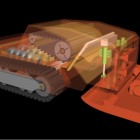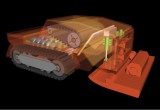Research and Development of First 3D Paver to be Held at UC Davis Pavement Research Center
Monterey, CA, September 10, 2015 (Newswire.com) - Monterey, CA, September 10, 2015 (Newswire) -
The Transtec Group has publicly endorsed Advanced Paving Technologies, Inc. in developing the World’s First 3D Asphalt Paving Machine. The Transtec Group is a leading pavement-engineering firm credited with over 600 pavement related projects totally $20 billion in the US and half a dozen countries.
Professor John Harvey of the UC Davis Pavement Research Center spoke of the research to be funded saying, "By delivering asphalt in this manner compaction and smoothness levels will be maximized increasing the lifespan of the road.Getting the right amount of material to handle those deformations and undulations in the existing pavement means that we're going to get that better compaction and that really translates into some tremendous increases in pavement life which brings down the costs to taxpayers for the pavement."
John, Harvey
Dan Rozycki, President of The Transtec Group, said in the endorsement, “The variable screed of the 3-D asphalt paving machine is a very innovative concept that shows great potential in achieving a higher level of density and smoothness in our pavements. In turn, this would result in longer quality pavements and lower transportation costs.”
The Transtec Group endorsement comes in support of the October 15th, 2015 launch of a Kickstarter campaign to raise funding for the upcoming research project necessary to produce the 3D paver. The research will be conducted at the U.C. Davis Pavement Research Center in Spring/Summer 2016.
The 3D Asphalt Paving Machine will be used to rehabilitate broken roads Better, Faster, Cheaper and Cleaner. It improves upon current road rehabilitation methods that perpetuate a costly cycle of predictable road degradation. The result of this cycle is rough, bumpy roads, increased wear on vehicles, more money spent on road rehabilitation, unnecessary pollution and, of course, increased traffic congestion.

The machine will utilize Lidar scanning technology, 3D asphalt mat modeling and multi-segmented variable screed to deliver and compact asphalt material that will address any surface variation and minimize the amount of milling needed during rehabilitation projects. As opposed to the 2D flat screeds used in all current paving machines, the variable screed will allow road engineers to apply asphalt intelligently, delivering more or less material where needed to result in a smooth flat surface once compacted. This will provide better and more uniform compaction, which will greatly increase the life of the road and minimize the need to mill down the entire road surface. It’s the milling of roads that causes the long road delays, increased costs and additional carbon output.
Drivers, governments and businesses will benefit from:
· Faster road rehabilitation process
· Less funding allocated to asphalt rehabilitation projects
· Better traffic flow in urban and rural areas
· Less carbon emissions from road work and nearby traffic congestion
· Less road related damage to cars and trucks
· Increased options for paving contractors
· Smoother roads are safer and save gas mileage
Share:
